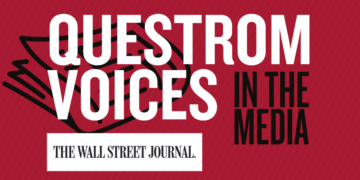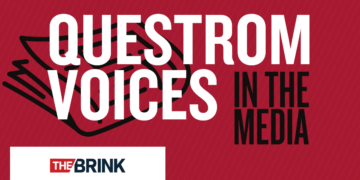Professor of Marketing Carey Morewedge, with coauthors Haewon Yoon (Indiana University Kelley School of Business) and Irene Scopelliti (Business School of City, University of London), recently completed a study on groundbreaking cognitive bias interventions. The results show that observing someone else make decisions can improve our own decision-making. Carey sat down with Insights@Questrom to explain this research and its importance for business leaders.
Question 1: Can you provide an overview of your recent research on cognitive bias?
Morewedge: In three experiments, we test whether people can improve their decision-making through observational learning—by watching others make decisions.
To date, training interventions designed to improve decision making by reducing cognitive biases, such as an endowment effect that leads sellers to overvalue their goods and services, have either informed people about biases and the direction of their influence on their decisions, explained strategies to reduce biases or provided people with practice making decisions and gave them direct feedback. In each of these methods, to learn, people have to make decisions and receive feedback on their own performance.
Question 2: Our new research explores whether people can learn from other’s successes and failures.
Morewedge: In the first experiment, we compared the effectiveness of observational learning to three other debiasing training interventions. The first group of participants received a practice-based intervention, they made the same kinds of decisions twice. A second group watched a 30-minute instructional video that explained techniques for mitigating cognitive bias. A third group played a 90-minute ‘serious’ video game in which players make a series of judgments and receive personalized feedback that teaches them to be less biased. The critical fourth, observational group, watched others play this serious game and the feedback those game players received. This fourth observational learning intervention tested whether watching another person’s good and bad decisions might improve one’s own decision making, and how effective observation is relative to receiving instruction or direct feedback.
In a second experiment, we tested if observational learning has any unique benefits. If combined with instruction, it can help improve decision-making over and above just an instruction-based intervention by itself. All participants played a very tame guessing game. Each saw two different sets of pictures of 10 household objects, like a garden gnome, and had to guess their weight. After each initial guess for the first set of pictures, participants were shown another participant’s guess. They then could modify their initial guesses if they wanted to incorporate this “advice” from the other participant. The extent to which each participant changed their initial guess is what we call “weight on advice,” or the extent to which the input of others changes a person’s estimation.
Before seeing the second set of pictures, participants received one of four debiasing interventions that taught an averaging rule. Our judgments are usually improved when we average our own estimates with the estimates of other people. An instruction-based intervention simply explained that judgments are usually improved when people average their own estimates with others’ estimates. A second, observational learning intervention, involved watching a video of another participant averaging her estimate with another participant’s estimate. A third group of participants received both interventions, and a control group received no intervention. All participants then guessed the weight of objects in the second set of pictures and we measured their use of the advice they were provided (their weight on advice).
The third experiment replicated the second, but participants were given advice generated by an algorithm rather than humans to test the ceiling for the benefits of advice on their decisions.
Question 3: What were the key takeaways from this study?
Morewedge: Observing others was a highly effective debiasing intervention. In the first experiment, we found participants who observed others playing the game improved their decision making and reduced their susceptibility to all three cognitive biases tested: anchoring (where one piece of information influences another judgment), their ability to judge risk, and their ability to understand people’s beliefs.
The observational learning intervention was more effective than the instructional video, and in some cases was as effective as direct feedback provided by the serious game. Surprisingly, it didn’t matter whether the person they watched made better or worse decisions. Observers learned equally well from others’ successes and failures.
The second and third experiments showed that observational learning provides unique debiasing benefits. Both interventions increased participants’ advice-taking. Participants who receive either intervention were more likely to use the averaging rule and combine their estimates and the advice they received. Most importantly, the combination of observational learning and the instructional intervention was more effective at teaching the averaging rule and improving advice taking than either intervention on its own. Seeing someone else use a strategy to improve their decision-making provided unique benefits beyond direct instruction.
Together, the results show that observing someone else make decisions can improve our own decision-making.
Question 4: How does this study connect to other research you’ve done in this area previously?
Morewedge: Until about six years ago, many thought there wasn’t much benefit in trying to teach people to make better decisions. It was widely believed that the best ways to improve people’s decision-making was by changing the context in which they were making choices (“choice architecture”) or changing the incentives to make better decisions (e.g., sin taxes). If you wanted to change behavior, you had to change people’s options, how those options were presented, or the costs associated with choosing good and bad options.
Our work has demonstrated that debiasing training can improve decision-making immediately and over the long-term. Our past work rigorously tested if any training can help improve decision-making and reduce susceptibility to cognitive biases and if lab training can help managers improve their ability to make complex business decisions. We build on this earlier work by showing that a new and scalable kind of debiasing training – watching someone else make decisions and observing their successes and failures – can improve decision making.
Question 5: What practical applications do these results have in business?
Morewedge: Most business decisions are made under uncertainty. We don’t have a perfect view of the market, our consumers, or the future. People make the best judgments they can under limited information, but that uncertainty opens the door to the influence of cognitive biases on their decision-making.
Many businesses, particularly in finance, are interested in debiasing training, but on an individual level, it can be very costly. Our video games cost $7 million to produce and test. Our research shows that cheaper, scalable interventions can be effective. People can substantially improve their decision-making by observing others. This research is an existence proof, but the work that follows from it could substantially reduce costs and guide businesses toward implementing debiasing training in their organizations.
Question 6: Are there other, non-business applications of this study?
Morewedge: A lot of how we learn is through watching other people. We can now learn from YouTube demonstrations anything from new makeup techniques to how to swap an engine. Through the pandemic, many students say they do not feel they are getting the same quality of education remotely. An important factor is because we learn more when we see others ask questions and work through similar problems. This kind of observational learning is more difficult through remote learning. Both these examples highlight the importance of modeling – watching and mimicking others’ behavior – for learning. Our findings look at this concept of modeling to see if it can reduce bias and improve decision-making.
Question 7: Do you have plans to elaborate on this study in the future?
Morewedge: The work is moving towards understanding the structure of cognitive biases so we can better design interventions to mitigate them. We have done a lot of work to show that debiasing training is effective and to push the boundaries on new kinds of debiasing training. Now we want to better understand the biases themselves and test more targeted kinds of interventions. We would love to work with companies interested in developing training interventions that can be tested in the field.























